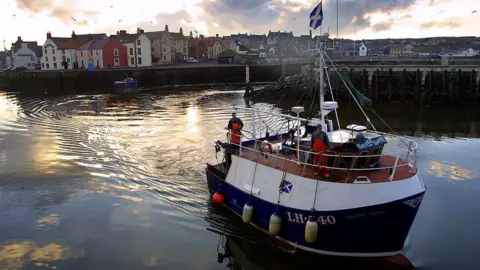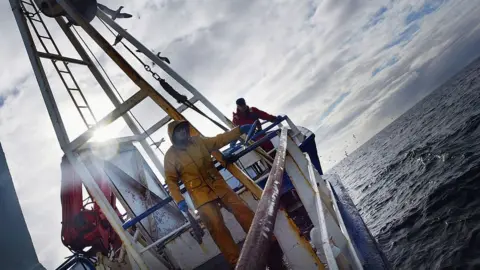Scottish fishing industry 'deeply aggrieved' by Brexit deal
 Getty Images
Getty ImagesScotland's fishing industry will have access to fewer cod, haddock, whiting and saithe under the new Brexit deal, according to the Scottish government.
They claim it could have a knock-on effect on harbours, fish markets and processors across the country.
Industry leaders say they are "deeply aggrieved" by the "very challenging" situation they are facing in 2021.
The UK government has insisted the deal delivers what was promised to fishermen and coastal communities.
And it said quotas could be increased further via annual talks with other nations, insisting there would be "a substantial transfer" from the EU to the UK.
Negotiations went down to the wire over what EU fishing boats are allowed to catch in UK waters ahead of the announcement of a deal on Christmas Eve.
Until the end of this year, the UK will be bound by the EU's rules - including the Common Fisheries Policy (CFP).
The Scottish government claims that after 1 January 2021, Scotland's fishing fleet will face new limits on their ability to land white fish stocks - including some species of cod and haddock.
"Pelagic" landings - such as mackerel and herring - and some other stocks will see a modest gain.
Under the current rules, Scottish boats can:
- catch quota that has been allocated to the Scottish industry
- lease quota from other producers
- swap quotas of fish that we have and still need but other countries want more of
The Scottish government says that under the new deal swapping quotas will no longer allowed and leasing will be "prohibitively expensive".
A scheme called the Hague Preference, which gives Scottish boats extra quota, has also been lost under the Brexit deal, ministers claim.
 Getty Images
Getty ImagesThe UK government said quota transfers would still be allowed as part of annual talks, saying in-year transfers would be available "particularly focusing on where one party has under-utilised fish quota that can be released".
A spokeswoman said the deal put the country in a position to rebuild the fishing fleet and "deliver increased fishing quotas through annual negotiations with the EU and other coastal states".
"Scotland, like the rest of the UK, will benefit from tariff-free access to EU markets and investment in our fishing communities as we free ourselves from the EU's Common Fisheries Policy," she added.
However the Scottish Fishermen's Federation said the annual talks over stocks would be "meaningless", and that the UK had "no negotiating capital left with which to increase shares of the fish in our own waters".
Chief Executive Elspeth Macdonald added: "The adjustments to UK shares of fish are modest at best, and in some cases will leave us with some very real practical fisheries management problems.
"A fundamental error was made by the government not securing sufficient quota uplift in some key stocks to take account of international swaps, which will no longer be possible in the same way."
'Significant shortfalls'
Meanwhile, Mike Park - chief executive of the Scottish White Fish Producers Association - said members were "deeply aggrieved at the very challenging situation they now face for 2021".
"Whereas we have gained modest uplifts in shares for some stocks, the stark reality is that the demersal sector enters 2021 facing significant shortfalls across a range of key species, which is down to the fact that we can no longer enter into direct swaps with colleagues in Europe," he said.
"In addition, the issue of sovereignty and our future ability to negotiate additional shares after the five-and-a-half-year window would seem clouded by so much complexity that it is difficult at this time to see how the UK government can use its newly recovered sovereignty to improve the situation of my members."
Scottish Rural Economy Secretary Fergus Ewing said: "This is a terrible outcome for Scotland's coastal communities.
"The small gains in quota for mackerel and herring are far outweighed by the impact of losses of haddock, cod and saithe - and that threatens to harm onshore jobs and businesses linked to harbours, fish markets and processing facilities. "
Scottish Secretary Alister Jack insisted that the deal "delivered what we promised", and would give UK fishing fleets "near-exclusive access to inshore waters up to the historic 12-mile limit".
He said: "We are regaining control of our waters, we are restoring our status as an independent coastal state and, even during the five-year adjustment period, there will be a big overall increase in our share of the catch in our waters."
